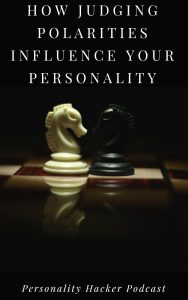Download Episode Here – right click link and select “Save Link As…”
In this episode, Joel and Antonia continue to dive into deep personality type content around the cognitive function polarities, what they are, why they are important, and how they influence your personality. On the last episode they talked about the perceiving polarities. In this “part two” episode Joel & Antonia discuss the Judging Polarities.
To subscribe to the podcast, please use the links below:
Subscribe with iTunes
Non-iTunes Link
Download The Android App
Subscribe on Soundcloud
Subscribe with Stitcher
Subscribe on Google Play
Subscribe with Facebook Messenger
If you like the podcast and want to help us out in return, please leave an honest rating and review on iTunes by clicking here. It will help the show and its ranking in iTunes immensely! We would be eternally grateful!
Want to learn more?
Discover Your Personal Genius
We want to hear from you. Leave your comments below…



Share:
Podcast - Episode 0256 - How Perceiving Polarities Influence Your Personality
Podcast - Episode 0258 - 3 Frameworks To Reflect On Personal Growth
29 comments
I wonder if this is an example of the difference between the emotional experiences of Fe and Fi. Your question seems to be very much about having similar emotional reactions to a given situation, which, as you have noted, doesn’t always happen. This sounds like a Fe way to process: I’ll calibrate my emotions based on how others are feeling in this situation. If you’re looking for emotional resonance it’s distressing when others aren’t reacting the same way.
To an Fi user, emotions are understood independent of situations and of how others are reacting. It doesn’t matter so much that others are reacting differently to the same situation. It’s the emotions themselves that the Fi user connects to, however they might have come about. As an INFP, I understand and empathize with your confusion, because I have also been confused. It doesn’t matter that what confuses you does not confuse me, or that what saddens you does not sadden me. I see your emotion and respond with empathy because I too have had that emotion. I know what it looks like and feels like in myself so I figure that your emotion may look and feel similar to you. My understanding may nothing to do with my own reaction to the situation that you are reacting to. For example, I can comfort the fear of a small child frightened by a clown, not because I am also scared of clowns but because I recognize and understand the experience of being scared.
Hi Justine- I’ve found your comments really interesting and understand the frustration. As a dominant Fi user, I can say that what is confusing to you resonates perfectly with me. I would guess that the disconnect for you is perhaps that Fi perhaps either isn’t in your ‘stack’, or else is low down and you are possibly a ‘thinker’ in the system. Antonia’s explanation put words beautifully to what can be a hard function to articulate as it is often not felt in words and isn’t logic based by nature. I hope this helps you.
You mentioned and I find it to be so helpful that your polarities of Te and Ti round out your podcast with bringing examples and application and bringing clarification and description. How do you honor both polarities in your relationship? Do they essentially run parallel and you leave time and space for the other to work on needed balance? Or are there ways they can help each other in the balance finding?
Thanks for responding, but I have to strongly disagree that this is just about ‘nuance’.
People can respond very differently in the same situation because they are coming from a very different emotional or historical context. I have often heard people say things along the lines of ‘well it didn’t bother me (insinuation: so why would it bother you?). The fact that people have very different likes and dislikes also demonstrates we are often experiencing things very differently.
If you’re saying that people will respond similarly to the same situation if they were experiencing it from a similar emotional context, then I can agree that is likely to be true, but it isn’t actually clear to me this is what you meant.
I realise we might be talking at cross purposes, so can only hope this is the case but nevertheless this remains a big confusing hole in my understanding of Fi.
I think it’s a bad idea to throw (apparent) contradictions into podcasts or books without contextualizing them, otherwise it just creates unnecessary confusion. I’m sorry if I’m sounding negative – I actually enjoy your podcasts, despite remaining very frustrated that none of these types are really resonating with me.
For me, personally, I find a lot of the difficulties I have had in communicating often end up relating to these two polarities. It is much easier for me to appeal to Fi and Te as an ENFP. I feel that I usually just don’t “get” Fe and Ti when the functions are in play in certain scenarios.
For instance, I was talking to my ESFJ mom last month about life, and she mentioned how a relative (who I suspect is a very immature, unhealthy ESFJ) was trying to stir up a fight by using Facebook as a platform to emphasize how she thought of getting an Christmas decorations for an elderly relative when other family members such as my mom didn’t. My mom showed me the posts (since I have effectively estranged myself from this particular relative who I refuse to speak to or even give a slight opportunity to harass me). And I just thought, “Okay. Maybe this is to stir up drama. But this is the stupidest method to start a conflict that I have ever seen in my life. Who even thinks of this?” Thinking about it, it may have had to deal with the desire for feedback and sort of gratification that this relative did such a good thing.
Perhaps, my Fi and Te just took the perspective of, “So what? You took a senior citizen to buy Christmas decorations. Big deal. That’s a minor good compared to all of the vile things you have said and done, and it doesn’t even start to override anything.” The aforementioned actions also heavily violated my Fi principles, so that’s probably a big part of it.
I also see the odd relationship between the two polarities frequently when I talk to my ISTP dad about an issue. He’s very much focused on the specific meanings of what is said. Sometimes, I might confuse the meaning, use a word in a figurative sense but fail to convey that, or send multiple conflicting messages. Even if he agrees with what I’m saying, he always asks me what I mean and prompts me to clarify and use more accurate language. It can be maddening sometimes, but I really appreciate it since it helps me to communicate more clearly.
I had to laugh at the comment about TPs being dicks. Of course, that is way too general. But I think Ti has the potential to be seriously abrasive when not used well. I think that is where the stereotype comes from.
Then again, all of the functions can have a rather abrasive side. For me, my Fi once emerged in an unhealthy light by manefesting as a sense of moral superiority and self-righteous indignation. I have seriously in portions of my life related to the scene of Scar in the Lion King saying “I’m surrounded by idiots.” Just replace idiots with “terrible people” or “jerks.” Thinking back on it, that is probably the reason I had trouble making and keeping friends in my early adolescence. I also had some severely screwed up mental programming and paradigms around it—most of which was subliminally and/or unintentionally instilled in me.
Interestingly, the only time I can relate to the notion that a person is angered by something that reflects negatively on themself is involved in how I absolutely detest when someone makes claims of superiority or when I am accused of thinking I’m superior. I really hate that I still admittedly have that streak buried in my mind. I tend to flip to that mind-frame in brief moments under stress. Holistically, I am adamant that I am no better or worse than anyone else. I am just another human being with both positive and negative qualities. But, my gut reaction definitely can reflect that self-righteous streak.